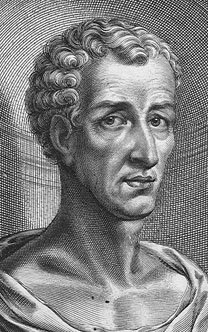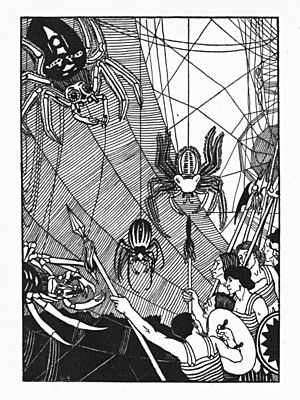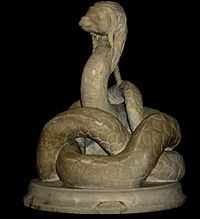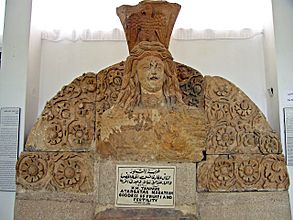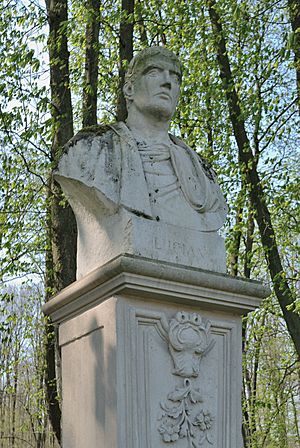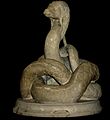Lucian facts for kids
Quick facts for kids
Lucian
|
|
|---|---|
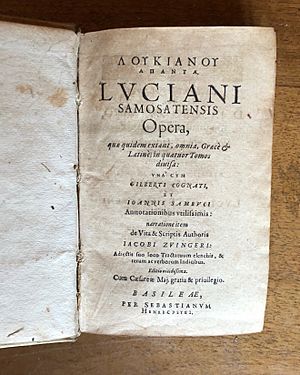
Title page of a 1619 Latin translation of Lucian's complete works
|
|
| Born | c. 125 AD Samosata, Roman Syria |
| Died | After 180 AD probably Egypt, Roman Empire |
| Occupation | Novelist, satirist, rhetorician |
| Notable works | A True History, Dialogues of the Dead, Lover of Lies, Dialogues of the Gods, Alexander the False Prophet, Philosophies for Sale, The Carousal, or The Lapiths |
Lucian of Samosata (born around 125 AD) was an ancient writer from Syria who wrote in Greek. He was famous for his funny and sarcastic style. He often made fun of old superstitions, religious practices, and beliefs in magic or ghosts. Even though his first language was probably Syriac, all his surviving works are written in ancient Greek.
Most of what we know about Lucian's life comes from his own writings. It can be tricky to understand them because he used a lot of sarcasm. He was born in Samosata, a city in the Roman province of Syria. As a young man, he tried to become a sculptor like his uncle, but it didn't work out. He then ran away to get an education.
Lucian became a traveling speaker, visiting universities across the Roman Empire. After becoming famous and wealthy, he settled in Athens for about ten years. During this time, he wrote most of his well-known works. Later in life, he might have worked as a government official in Egypt. After that, he disappears from history.
Lucian's writings were very popular in ancient times. More than eighty of his works still exist today, which is a lot more than for most other ancient writers. His most famous work is A True History. It's a funny story that makes fun of authors who tell unbelievable tales. Some people even call it the earliest known work of science fiction. Lucian also invented a new type of writing called the "comic dialogue."
Contents
Lucian's Life Story
Everything we know about Lucian comes from his own writings. He often wrote about characters who seemed like him. However, historians warn that Lucian liked to tell jokes and might not have always been completely truthful about himself.
Early Life and Education
Lucian was born in Samosata, a town by the Euphrates River. This was on the eastern edge of the Roman Empire. Most people there spoke Syriac, which was probably Lucian's first language.
During Lucian's time, traditional Greek and Roman religions were changing. Many people joined special mystery groups instead. Superstition was also very common. Most educated people followed different types of philosophy. Major cities had universities with traveling lecturers who taught these ideas. Athens was the most respected center for learning.
In one of his speeches, The Dream, Lucian said his parents were not rich. His uncles owned a statue-making shop. Lucian's parents couldn't afford a higher education for him. So, after elementary school, he became his uncle's apprentice to learn sculpting. But Lucian wasn't good at it and ruined a statue. His uncle hit him, and Lucian ran away. He fell asleep and dreamed that two figures, Statuary and Culture, were fighting over him. He chose Culture and decided to get an education.
Some scholars think The Dream might not be a true story about Lucian's life. They see it as a playful story about a young man seeking knowledge.
His Career and Travels
In another work, Double Indictment, Lucian describes a "Syrian" writer who was wandering in Ionia (part of modern Turkey). This writer was "still speaking in a barbarous manner." A character called Rhetoric took him in hand and "gave him education." Many scholars believe this "Syrian" is Lucian himself.
Ionia was a major center for learning about rhetoric, which is the art of speaking and writing well. The best universities were in Ephesus and Smyrna. We don't know how Lucian paid for his education, but he learned a lot about rhetoric, literature, and philosophy.
Lucian wrote that he first tried to be a lawyer, but he didn't like how dishonest the job was. So, he decided to become a philosopher instead. He traveled across the Roman Empire, giving lectures in Greece, Italy, and Gaul (modern France). In Gaul, he might have had a well-paid job as a government professor.
Around 160 AD, Lucian became a wealthy and famous person. He visited his hometown of Samosata and stayed in the eastern part of the empire for several years. He was in Antioch around 162 or 163 AD. Around 165 AD, he bought a house in Athens and invited his parents to live with him. He must have gotten married at some point, as he mentions having a son.
Lucian lived in Athens for about ten years. He stopped lecturing and focused on writing. Most of his famous works were written during this time. He wrote only in Greek, mostly in a style popular at the time called Attic Greek.
For unknown reasons, Lucian stopped writing around 175 AD and started traveling and lecturing again. During the rule of Emperor Commodus (180–192 AD), Lucian might have gotten a good government job in Egypt. After this, he disappears from history, and we don't know when or how he died.
Lucian's Ideas and Views
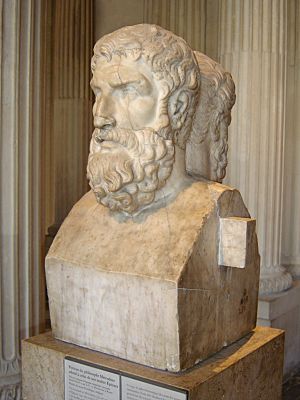
It's hard to pin down Lucian's exact philosophical ideas because he used so much irony. In one work, The Fisherman, he said he was a champion of philosophy. He saw philosophy as something that could make people better. However, he often criticized fake philosophers who were greedy or hypocritical.
Lucian didn't belong to any single major philosophical group. In his work Philosophies for Sale, he made fun of members from every school of thought. He was critical of Stoicism and Platonism because he thought they encouraged superstition.
Still, Lucian sometimes wrote positively about certain philosophies. He seemed to lean towards Skepticism, which questions whether we can truly know anything for sure. In Hermotimus, he suggests that life is too short to figure out which philosophy is right. So, it's best to rely on common sense.
Lucian was also skeptical of oracles and didn't believe in the paranormal. He thought it was just superstition. In The Lover of Lies, his character Tychiades says he doesn't believe in ghosts or spirits because he's never seen them. However, Tychiades still believes in the existence of the gods.
Lucian was greatly influenced by the Cynics, a group of philosophers who believed in living a simple life. He especially admired Menippus, a Cynic philosopher and satirist. Lucian also greatly admired Epicurus, another philosopher, calling him "truly holy and prophetic."
Lucian's Writings
Lucian wrote over eighty works that have survived. These include funny dialogues, essays, and stories. His writings were for educated Greek audiences and often referred to Greek history and culture. When his works were rediscovered much later, many of the older texts he referenced had been lost. This made it harder for new readers to understand all his jokes.
A True Story
Lucian was one of the first novelists in Western history. In A True Story, he wrote a fictional story that made fun of the amazing tales told by Homer in the Odyssey. He also poked fun at historians like Thucydides.
This novel predicted modern science fiction ideas. It included trips to the moon and Venus, extraterrestrial life, wars between planets, and artificial life. He wrote about these things almost 2,000 years before writers like Jules Verne and H. G. Wells. Because of this, it's often seen as the earliest known science fiction work.
The story starts with Lucian explaining that it's not "true" at all; everything in it is a complete lie. Lucian and his friends sail past the Pillars of Heracles. A storm blows them to an island with a river of wine and trees that look like women. Later, a whirlwind takes them to the Moon. There, they get caught in a war between the Moon king and the Sun king over the Morning Star. The Sun's army wins by blocking out the Moon's light. After a peace agreement, Lucian describes life on the Moon.
After returning to Earth, the adventurers are swallowed by a giant whale. Inside, they find fish people and fight them. They escape by starting a fire and propping the whale's mouth open. They then find a sea of milk, an island of cheese, and the Island of the Blessed. There, Lucian meets heroes from the Trojan War, mythical creatures, and famous people like Homer and Pythagoras. He also sees sinners being punished, especially those who wrote books with lies. The book ends suddenly, with Lucian promising more adventures in future parts, which never came.
Funny Dialogues
Lucian was very proud of inventing the "satirical dialogue." This was a funny version of the older Platonic dialogue, which was more serious and philosophical.
His Dialogues of the Dead is a satirical work about the Cynic philosophers Diogenes and Menippus. They lived simply when alive and are now comfortable in the Underworld. Meanwhile, those who lived in luxury are suffering.
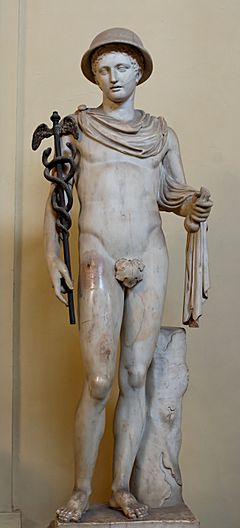
In The Lover of Lies, Lucian makes fun of people who believe in the supernatural. The main character, Tychiades, is a skeptic. He visits a sick friend, Eukrates, whose guests try to convince Tychiades to believe in magic by telling increasingly silly stories. One of these stories is "The Sorcerer's Apprentice", which later inspired a famous poem.
Lucian often made fun of philosophers. In Philosophies for Sale, Zeus sells famous philosophers in an imaginary slave market. Each philosopher tries to convince customers to buy his ideas. In The Banquet, or Lapiths, Lucian shows the hypocrisy of philosophers from different schools.
Lucian also wrote many dialogues making fun of traditional Greek stories about the gods. His Dialogues of the Gods has many short scenes that parody Greek mythology. The gods are shown as weak and full of human emotions. Zeus is often shown as a "useless ruler." Lucian also wrote Zeus Catechized and The Parliament of the Gods. In his dialogues, Lucian often featured Hermes, the messenger of the gods, who travels between worlds.
Essays and Letters
Lucian's essay Alexander the False Prophet describes a trickster named Alexander of Abonoteichus. Alexander claimed to be a prophet of a snake-god named Glycon. Even though Lucian's account is funny, it seems to be mostly accurate. Archeological finds like coins and statues have confirmed many of Lucian's statements about the Glycon cult. Lucian describes meeting Alexander and biting his hand instead of kissing it. He also noted that only Epicureans and Christians dared to challenge Alexander.
Lucian's essay On the Syrian Goddess describes the worship of the Syrian goddess Atargatis in Hierapolis. It's written in a style that imitates the historian Herodotus. For a long time, some scholars doubted Lucian wrote it because it seemed too serious. But more recently, scholars agree it's satirical and Lucian's work.
In this essay, Lucian makes fun of the differences between "Greeks" and "Assyrians." He shows how Syrians adopted Greek customs and became "Greeks" themselves.
In his satirical letter Passing of Peregrinus, Lucian describes the death of the philosopher Peregrinus Proteus. This letter is important because it's one of the earliest non-Christian writings about Christianity. In the letter, a character makes fun of Christians for being too trusting. However, he also respects their good morals.
Lucian's Lasting Impact
Influence on Later Writers
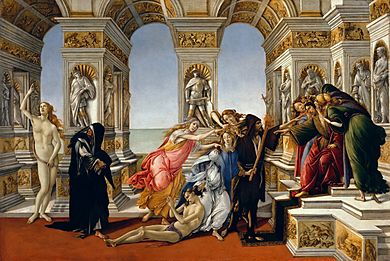
Lucian's writings were mostly forgotten during the Middle Ages. But they were rediscovered during the Renaissance and quickly became popular. By 1400, there were as many Latin translations of Lucian's works as there were for Plato and Plutarch. His Dialogues of the Dead were especially popular and used to teach morals.
Lucian's writings greatly influenced many writers from the Renaissance and later. Many early European writers copied his lighthearted style and his way of telling fantastic journeys through conversations. During the Protestant Reformation, Lucian's style was used by writers to make fun of Catholic clergy.
A True Story inspired Sir Thomas More's Utopia (1516) and Jonathan Swift's Gulliver's Travels (1726). The artist Sandro Botticelli based his paintings The Calumny of Apelles and Pallas and the Centaur on descriptions found in Lucian's works. William Shakespeare's play Timon of Athens was inspired by Lucian's story Timon the Misanthrope. Even a famous line from Shakespeare's Hamlet echoes scenes from Lucian's Dialogues of the Dead.
Modern Influence
Many later writers continued to be inspired by Lucian. Henry Fielding, who wrote The History of Tom Jones, a Foundling, owned all of Lucian's works. He called Lucian "the true father of humour" and a master of satire. Writers like Voltaire and Denis Diderot also wrote their own versions of Lucian's Dialogues of the Dead. Voltaire even wrote a dialogue where he treated Lucian as one of his teachers.
Lucian's True Story also inspired Cyrano de Bergerac, whose writings later inspired Jules Verne. The German satirist Christoph Martin Wieland translated all of Lucian's works into German.
In the 19th and early 20th centuries, some scholars didn't like Lucian's works as much. They sometimes called him an "Oriental without depth or character." However, in the 21st century, Lucian's Syrian background has gained new attention. Scholars now see him as an example of someone who blended different cultures and identities.
Images for kids
-
Bust of Epicurus, an Athenian philosopher Lucian admired.
-
Hermes, the messenger of the gods, often appears in Lucian's dialogues.
-
Nabataean carving of the goddess Atargatis, subject of Lucian's On the Syrian Goddess.
-
The Calumny of Apelles by Sandro Botticelli, inspired by Lucian's description of a painting.
See also
 In Spanish: Luciano de Samósata para niños
In Spanish: Luciano de Samósata para niños
 | Mary Eliza Mahoney |
 | Susie King Taylor |
 | Ida Gray |
 | Eliza Ann Grier |


